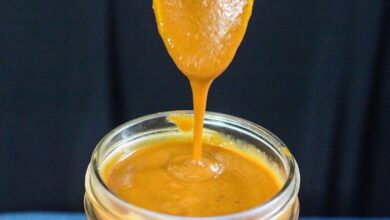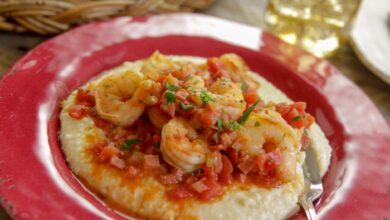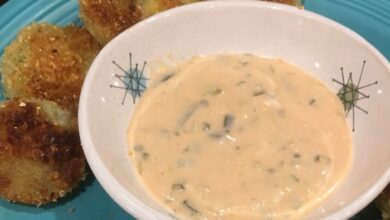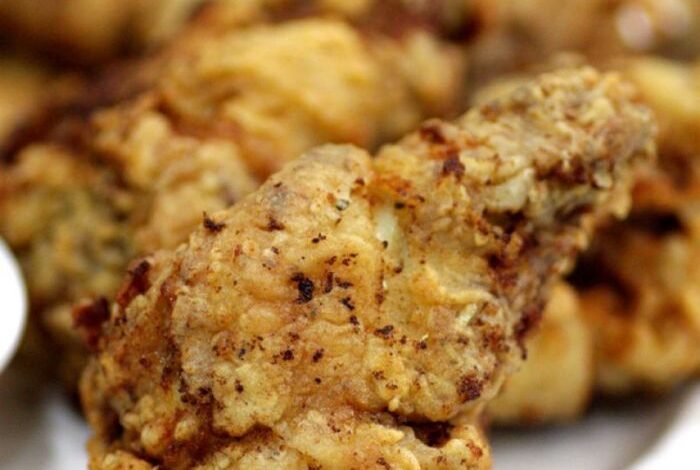
Buttermilk Fried Chicken Wings: A Southern Classic
Buttermilk fried chicken wings are a culinary delight that has captured hearts and taste buds across the globe. These crispy, juicy, and flavorful wings are a staple in Southern cuisine and have become a beloved snack and appetizer everywhere. From the humble origins of this dish to the endless variations and flavor profiles, buttermilk fried chicken wings have a rich history and a captivating story to tell.
The secret to their irresistible taste lies in the buttermilk marinade, which tenderizes the meat and adds a unique tanginess. The process of frying the wings to golden perfection is an art form in itself, requiring precise temperature control and careful attention to detail.
Whether you prefer them plain, spicy, or glazed with honey garlic, buttermilk fried chicken wings are sure to satisfy your cravings.
Buttermilk Fried Chicken Wings
The tantalizing aroma of crispy, golden-brown fried chicken wings is a sensory experience that has captivated taste buds for generations. Buttermilk fried chicken wings are a culinary masterpiece, a harmonious blend of flavors and textures that has earned its place as a beloved comfort food.
The origins of this dish can be traced back to the Southern United States, where it has become deeply ingrained in the region’s culinary heritage.
The History and Origins of Buttermilk Fried Chicken Wings
The history of fried chicken wings is closely tied to the Southern United States, where it emerged as a popular dish in the early 20th century. While the exact origin remains somewhat elusive, it is believed that fried chicken wings gained popularity in the 1960s, particularly in Buffalo, New York, where the iconic Buffalo wings were born.
However, the use of buttermilk as a marinade for fried chicken has a much longer history in the South, dating back to the 19th century. Buttermilk, a fermented dairy product, was readily available in rural areas and was used as a natural tenderizer and flavor enhancer for poultry.
The combination of buttermilk and fried chicken wings, therefore, represents a fusion of culinary traditions and innovation.
The Cultural Significance of Fried Chicken Wings in the Southern United States
Fried chicken wings hold a special place in the Southern United States, where they have become a staple food at family gatherings, potlucks, and sporting events. The dish is often associated with Southern hospitality and the joy of sharing a meal with loved ones.
Fried chicken wings are also deeply intertwined with the history and culture of African Americans in the South, who have played a significant role in shaping the culinary landscape of the region. From backyard barbecues to upscale restaurants, fried chicken wings continue to be a beloved and cherished dish in the South.
The Role of Buttermilk in Creating the Signature Flavor and Texture of Fried Chicken Wings
Buttermilk plays a crucial role in creating the signature flavor and texture of fried chicken wings. Its acidity helps to tenderize the meat, making it juicy and flavorful. The buttermilk also creates a crispy, golden-brown crust when the wings are fried.
This is because the buttermilk proteins react with the heat of the fryer, forming a flavorful, crispy exterior. The tangy flavor of buttermilk adds a unique dimension to the fried chicken wings, balancing the richness of the fried chicken.
Moreover, buttermilk helps to lock in moisture, ensuring that the wings stay tender and juicy even after they are fried.
The Art of Preparation
The journey to crispy, juicy, and flavorful buttermilk fried chicken wings starts with careful preparation. This involves a series of steps that contribute to the final taste and texture.
Brining the Wings
Brining is an essential step in preparing chicken wings, as it helps to retain moisture and enhance flavor. This technique involves soaking the wings in a salt-based solution, which draws out moisture and then reintroduces it along with the salt.
This process helps to tenderize the meat and improve its overall flavor profile.
For a simple brine, dissolve 1 cup of salt in 4 cups of water. Add the chicken wings and refrigerate for at least 4 hours, or up to overnight.
Marinating the Wings
Marinating adds a burst of flavor to the chicken wings. The marinade penetrates the meat, tenderizing it and infusing it with the desired flavors.
- Buttermilk marinade:Buttermilk is a classic choice for marinating chicken wings. Its acidity helps to break down the protein, resulting in tender and flavorful wings. Combine buttermilk with your favorite spices, such as paprika, garlic powder, and onion powder.
- Spicy marinade:For a fiery kick, use a spicy marinade. Combine hot sauce, chili powder, and other spices to create a marinade that packs a punch.
- Herb marinade:Enhance the flavor of the wings with a fresh herb marinade. Combine chopped herbs like rosemary, thyme, and parsley with olive oil and lemon juice.
Dredging the Wings
Dredging the wings in flour helps to create a crispy crust. This step involves coating the wings in a mixture of flour and spices, ensuring a golden-brown and flavorful exterior.
- All-purpose flour:All-purpose flour is a common choice for dredging chicken wings. It creates a light and crispy crust.
- Self-rising flour:Self-rising flour contains baking powder and salt, which helps to create a slightly more airy and flavorful crust.
- Seasoned flour:For added flavor, use seasoned flour. Combine all-purpose flour with your favorite spices, such as paprika, garlic powder, and onion powder.
Frying Techniques and Equipment
The choice of frying method significantly impacts the final outcome of your buttermilk fried chicken wings. From classic deep frying to the modern air fryer, each method offers unique advantages and disadvantages. Selecting the appropriate technique depends on your preferences, available equipment, and desired results.
Deep Frying
Deep frying is the traditional method for achieving crispy, golden-brown chicken wings. This technique involves immersing the wings in a large volume of hot oil, allowing for even heat distribution and rapid cooking.
- Advantages: Deep frying produces the most consistently crispy and flavorful wings. The hot oil creates a protective barrier around the wings, preventing moisture loss and resulting in juicy, tender meat.
- Disadvantages: Deep frying requires a large amount of oil, which can be messy and potentially hazardous if not handled properly. It also requires a dedicated deep fryer or a large pot with a deep enough capacity.
Pressure Frying
Pressure frying utilizes a specialized appliance that combines the principles of deep frying and pressure cooking. This method uses a smaller amount of oil and cooks food faster, resulting in crispy wings with a juicy interior.
- Advantages: Pressure frying offers a faster cooking time compared to traditional deep frying, requiring less oil and producing crispy results. It is a convenient option for smaller batches of wings.
- Disadvantages: Pressure frying requires a specialized appliance, which may not be readily available to everyone. It can be challenging to achieve consistent results, especially for larger batches.
Air Frying
Air frying has gained popularity in recent years as a healthier alternative to traditional deep frying. This method uses hot air circulation to cook food, resulting in crispy wings with minimal oil.
- Advantages: Air frying uses significantly less oil than traditional deep frying, making it a healthier option. It is also convenient and easy to use, with a faster cooking time than conventional ovens.
- Disadvantages: Air frying may not produce the same level of crispiness as deep frying. The capacity of air fryers is often limited, making it less suitable for large batches of wings.
Flavor Profiles and Variations
The beauty of buttermilk fried chicken wings lies in their versatility. Beyond the crispy exterior and juicy interior, a world of flavor awaits, ready to be explored through the strategic use of spices, herbs, and sauces. From classic comfort food to bold and adventurous tastes, these wings can be tailored to suit any palate.
Spice Blends and Flavor Profiles
Spices are the heart and soul of any flavor profile. They add depth, complexity, and personality to the wings. Here’s a breakdown of common spice blends and the flavor profiles they create:
- Classic Southern:This blend typically includes paprika, garlic powder, onion powder, black pepper, and cayenne pepper. It delivers a warm, earthy, and slightly spicy flavor.
- Cajun:Cajun seasoning is a vibrant blend of paprika, cayenne pepper, garlic powder, onion powder, oregano, thyme, and black pepper. It delivers a fiery, smoky, and aromatic flavor.
- Herbed:Herbs like rosemary, thyme, and oregano add a fresh, earthy, and herbaceous dimension to the wings.
- Sweet and Spicy:This blend combines sweet spices like brown sugar and paprika with spicy elements like cayenne pepper and chili powder. It results in a balanced and addictive flavor profile.
Sauces and Glazes
Sauces and glazes elevate the flavor profile of fried chicken wings to a whole new level. They add moisture, richness, and an extra layer of complexity.
- Buffalo Sauce:This classic sauce is a blend of hot sauce, vinegar, butter, and garlic. It delivers a tangy, spicy, and addictive flavor.
- Honey Garlic Sauce:This sweet and savory sauce combines honey, soy sauce, garlic, and ginger. It delivers a rich, sticky, and umami-packed flavor.
- BBQ Sauce:BBQ sauce comes in various flavors, from sweet and smoky to tangy and spicy. It adds a smoky, caramelized, and savory dimension to the wings.
- Spicy Glazes:These glazes are typically made with chili peppers, hot sauce, and other spicy ingredients. They add a fiery kick to the wings, making them perfect for those who love a good heat.
Popular Variations
The versatility of buttermilk fried chicken wings extends beyond spice blends and sauces. There are countless variations, each with its unique flavor profile and appeal.
- Buffalo Wings:These are a classic and beloved variation, featuring crispy wings coated in a tangy and spicy buffalo sauce. They are often served with celery sticks and blue cheese dressing.
- Honey Garlic Wings:These wings are coated in a sweet and savory honey garlic sauce, creating a delicious and addictive flavor combination. They are often served with a side of rice or noodles.
- Spicy Wings:These wings are coated in a variety of spicy sauces, from mild to extremely hot. They are perfect for those who love a good heat and are often served with a side of sour cream or ranch dressing.
- Korean Fried Chicken:This variation features wings coated in a sweet and spicy Korean sauce, often with a crispy, almost-crackling texture. It is a popular street food in Korea and is increasingly gaining popularity worldwide.
Serving and Accompaniments
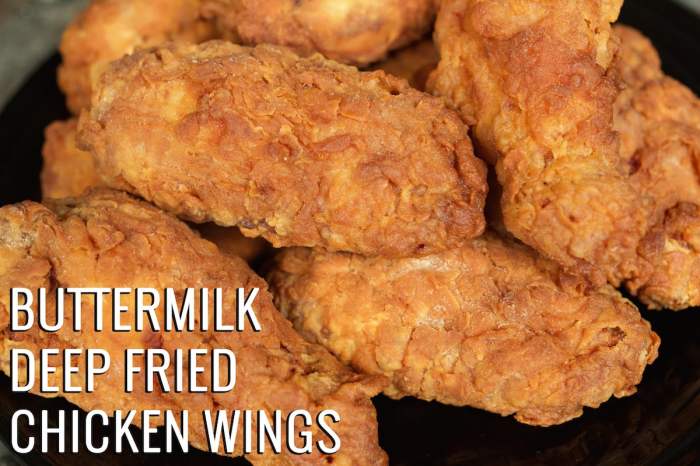
The culmination of your buttermilk fried chicken wing journey lies in the art of serving and presenting these crispy, flavorful delights. It’s not just about placing wings on a plate; it’s about creating an experience that tantalizes the senses and leaves a lasting impression.
Creative Serving Ideas, Buttermilk fried chicken wings
Serving buttermilk fried chicken wings goes beyond the traditional paper-lined basket. Consider these creative ideas to elevate the dining experience:
- Elevated Platter Presentation:Arrange the wings artfully on a rustic wooden platter, interspersed with fresh herbs like rosemary or thyme, and wedges of lemon for a touch of brightness.
- Individual Serving Bowls:For a more intimate setting, present each guest with a small, ceramic bowl filled with wings, ensuring everyone enjoys a personalized experience.
- Family Style:Encourage a communal dining experience by placing a large bowl of wings on the table, allowing guests to select their favorites and share stories as they indulge.
Side Dishes and Dipping Sauces
A well-chosen selection of side dishes and dipping sauces complements the flavors of the wings, creating a symphony of taste.
Side Dish Suggestions
| Side Dish | Description |
|---|---|
| Coleslaw | A classic pairing, coleslaw provides a refreshing contrast to the richness of the fried chicken. |
| Macaroni and Cheese | A comforting and indulgent side, macaroni and cheese adds a creamy element to the meal. |
| Potato Salad | A creamy and tangy potato salad balances the savory flavors of the wings. |
| Baked Beans | Sweet and smoky baked beans offer a unique flavor profile that complements the fried chicken. |
| Cornbread | A Southern staple, cornbread provides a crumbly texture and a hint of sweetness. |
Dipping Sauce Options
| Dipping Sauce | Description |
|---|---|
| Blue Cheese Dressing | A classic pairing, blue cheese dressing adds a tangy and creamy element to the wings. |
| Ranch Dressing | A popular choice, ranch dressing offers a creamy and herbaceous flavor. |
| Honey Mustard Sauce | A sweet and tangy sauce, honey mustard adds a touch of brightness to the wings. |
| BBQ Sauce | A smoky and savory sauce, BBQ sauce is a classic accompaniment to fried chicken. |
| Buffalo Wing Sauce | A spicy and tangy sauce, buffalo wing sauce is a popular choice for those who enjoy a kick. |
Presentation and Dining Experience
The presentation of your buttermilk fried chicken wings plays a crucial role in the overall dining experience.
“Presentation is key to creating a memorable meal.”
A visually appealing spread, with carefully chosen accompaniments, enhances the enjoyment of the food. Consider using colorful napkins, rustic wooden serving boards, and garnishes like fresh herbs and lemon wedges to create an inviting and aesthetically pleasing table setting. The dining experience should be enjoyable and comfortable.
Ensure the atmosphere is conducive to conversation and laughter. Provide ample seating, soft lighting, and music that complements the occasion.
Nutritional Considerations: Buttermilk Fried Chicken Wings
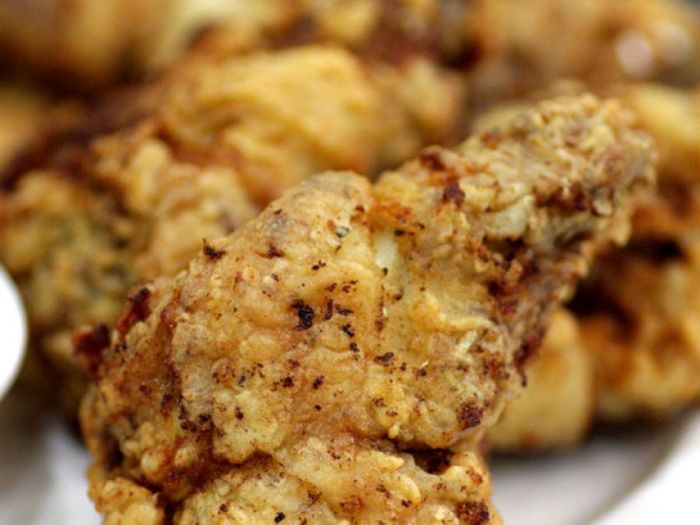
Buttermilk fried chicken wings, while undeniably delicious, are not the healthiest choice due to their high calorie and fat content. Let’s dive into the nutritional aspects of this dish and explore ways to make it a bit healthier.
Nutritional Breakdown
Fried chicken wings are a source of protein, but they also contain a significant amount of saturated fat, sodium, and calories. A typical serving of fried chicken wings can contain around 300-400 calories, 20-30 grams of fat, and 500-700 mg of sodium.
These numbers can vary depending on the size of the wings, the amount of batter used, and the type of oil used for frying.
Health Implications of Fried Foods
Consuming fried foods frequently can have negative health implications. The high fat content can contribute to weight gain, heart disease, and high cholesterol levels. The high sodium content can also lead to high blood pressure. Additionally, the process of frying food at high temperatures can create harmful compounds called acrylamide, which have been linked to an increased risk of cancer.
Healthier Versions of Fried Chicken Wings
While fried chicken wings are generally considered an unhealthy option, there are ways to make them a bit healthier. Here are a few tips:
- Choose leaner cuts of meat:Chicken wings are a fatty cut of meat. Consider using chicken breasts or thighs, which are leaner options.
- Reduce the amount of batter:The batter adds calories and fat to the chicken wings. Use a lighter batter or bread the wings in whole-wheat breadcrumbs instead.
- Use a healthier cooking method:Instead of frying, try baking, grilling, or roasting the chicken wings. These methods require less oil and can help reduce the calorie and fat content.
- Use a healthier oil:If you do fry the chicken wings, use a healthier oil like olive oil or avocado oil. These oils are high in monounsaturated fats, which are considered heart-healthy.
- Control portion sizes:Enjoy fried chicken wings in moderation. A small serving can be a delicious treat, but it’s important to be mindful of the portion size.
Sodium Reduction
High sodium intake can contribute to high blood pressure, which is a risk factor for heart disease and stroke. To reduce the sodium content of your fried chicken wings, you can:
- Use low-sodium buttermilk:Regular buttermilk can be high in sodium. Look for low-sodium buttermilk to reduce the sodium content of your marinade.
- Season with herbs and spices instead of salt:There are many delicious herbs and spices that can add flavor to your chicken wings without adding extra sodium. Try using paprika, garlic powder, onion powder, black pepper, cayenne pepper, or chili powder.
- Rinse the chicken wings before marinating:This can help remove some of the excess sodium from the chicken.


